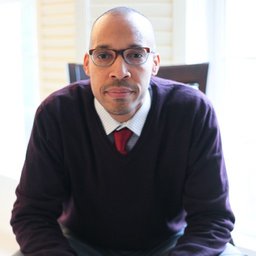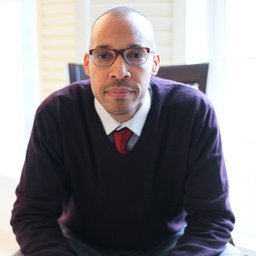African American Philosophy and Religion
Scroll below to select research from the following scholars

Dr. Tommy J. Curry
Title: Professor of Philosophy & Affiliate Professor of Africana Studies, USC Shoah Foundation and A.I. & Manet Schepps Foundation Teaching Fellow 16'-17', Ray A. Rothrock Fellow 13'-16' and Executive Director of Philosophy Born of Struggle
Research Topic: Cast Upon The Shadows: Essays Toward The Culturalogic Turn In Critical Race Theory
Institution: Southern Illinois University Carbondale
Committee Chair: Dr. Kenneth Stikkers
Abstract: Unlike many Black-specific disciplines in the academy (Black psychology, Black history, etc), Black philosophy never completely forged a unique conceptual framework separate from American and Continental intellectual traditions. Instead the field has continued to define its validity by the extent that Black authors extend the thought of white philosophers towards race. This epistemic convergence, or the extent to which Black theory converges with established white philosophical traditions, and hence white racial sensibilities continues to misguide many of the current philosophical systems of Africana thought. Because this practice is so dominate, it has made current scholarship in African American and Africana thought derelict, in the sense that all investigations into Blackness are normatively, hence ideologically driven, and not culturally relevant to the actual lives of Africana people.
Because whites are able to connect their work in traditional philosophy to studies of race under the misnomer of ―critical race theory,‖ these white associations with Black philosophy have given the illusion that integration and multicultural exchanges in Africana philosophy contribute to the restructuring of the discipline of philosophy and psychical changes in whites. Unfortunately this is merely wishful thinking that fails to consider the empirical research that confirms the undeniable failure of integration. This inability by Blacks to accept and explore racism without the illusion of racial coexistence in America makes current approaches to Black philosophy irrelevant to the present day struggles that Blacks find themselves burdened by in the American context. This dissertation however argues that the acceptance of the racial realist perspective, which accepts the permanence of racism, allows Blacks to ―conceptually disengage‖ the triumphalism of the integrationist myth and explore the world without the illusion of anthropological parity. This lacuna in the European narration of liberal democracy‘s vision of equality spurs the culturalogical turn in Critical Race Theory, and introduces the philosophical insights of Derrick Bell and Paul Robeson as guiding voices towards the silencing of the idealist trends in contemporary studies of racism.
To download the study click the link below!
Title: Professor of Philosophy & Affiliate Professor of Africana Studies, USC Shoah Foundation and A.I. & Manet Schepps Foundation Teaching Fellow 16'-17', Ray A. Rothrock Fellow 13'-16' and Executive Director of Philosophy Born of Struggle
Research Topic: Cast Upon The Shadows: Essays Toward The Culturalogic Turn In Critical Race Theory
Institution: Southern Illinois University Carbondale
Committee Chair: Dr. Kenneth Stikkers
Abstract: Unlike many Black-specific disciplines in the academy (Black psychology, Black history, etc), Black philosophy never completely forged a unique conceptual framework separate from American and Continental intellectual traditions. Instead the field has continued to define its validity by the extent that Black authors extend the thought of white philosophers towards race. This epistemic convergence, or the extent to which Black theory converges with established white philosophical traditions, and hence white racial sensibilities continues to misguide many of the current philosophical systems of Africana thought. Because this practice is so dominate, it has made current scholarship in African American and Africana thought derelict, in the sense that all investigations into Blackness are normatively, hence ideologically driven, and not culturally relevant to the actual lives of Africana people.
Because whites are able to connect their work in traditional philosophy to studies of race under the misnomer of ―critical race theory,‖ these white associations with Black philosophy have given the illusion that integration and multicultural exchanges in Africana philosophy contribute to the restructuring of the discipline of philosophy and psychical changes in whites. Unfortunately this is merely wishful thinking that fails to consider the empirical research that confirms the undeniable failure of integration. This inability by Blacks to accept and explore racism without the illusion of racial coexistence in America makes current approaches to Black philosophy irrelevant to the present day struggles that Blacks find themselves burdened by in the American context. This dissertation however argues that the acceptance of the racial realist perspective, which accepts the permanence of racism, allows Blacks to ―conceptually disengage‖ the triumphalism of the integrationist myth and explore the world without the illusion of anthropological parity. This lacuna in the European narration of liberal democracy‘s vision of equality spurs the culturalogical turn in Critical Race Theory, and introduces the philosophical insights of Derrick Bell and Paul Robeson as guiding voices towards the silencing of the idealist trends in contemporary studies of racism.
To download the study click the link below!
| cast_upon_the_shadows_etd_final.pdf | |
| File Size: | 1325 kb |
| File Type: | |
 @darylhowardphd
@darylhowardphd
Dr. Daryl C. Howard
Title: HUE Initiatives, Executive Director
Research Title: An Analysis of Black Power and Black Consciousness Philosophies and the Use of Christian Religion as a Tool for Empowerment And Social Protest
Institution: Howard University
Committee Chair: Mbye Cham, Ph.D.
Abstract: Blacks have been dehumanized and oppressed by the forces o f racism and
prejudice for hundreds of years. In the 1960s, blacks formalized a liberating and resistant form of thought. This thought, or consciousness, arose from the black masses and societal norms were challenged in a very powerful way. This consciousness was based on an ideology of refusing to allow the oppressor (Western culture and racist ideas) to continue to influence and control the minds and judgment of blacks. The black power and black consciousness movements represented an effort to change the racist system in the United States and the apartheid system in South Africa. These movements focused on conscientization, self-reliance, and social responsibility. Such movements helped blacks to look at their skin color as a source of strength and identity.
These movements not only adopted psychological forms of resistance, but encouraged the masses toward a spiritual understanding o f the fundamental nature of their resistance. Thus, an explicit black liberation theology was born. By marrying Christianity with a black culture of protest, resistance, and liberation, this new theology spoke directly to their struggle. The Christian religion spoke to the needs of the oppressed, poor, and broken masses and instilled hope and rejuvenation. The liberating aspects of the religion were relevant to their eternal destiny as well as to their present reality. Black liberation theology confirmed that the struggle against oppression was a righteous one.
The primary objective of this qualitative research is to analyze the relationship between black power and black consciousness philosophies and their use of Christian religion as a tool for empowerment and social protest. This topic is examined through the key tenets of these philosophies (affirmation of black culture and humanity, a holistic ethos of spirituality, political modernization, and self-reliance) and related political and cultural theological themes. The research includes an in-depth focus on each movement’s kindred elements and themes, examples of abstract and material social protest, and each movement’s overarching social constructs of ubuntu and collective empowerment.
To download the study click the link below!
Title: HUE Initiatives, Executive Director
Research Title: An Analysis of Black Power and Black Consciousness Philosophies and the Use of Christian Religion as a Tool for Empowerment And Social Protest
Institution: Howard University
Committee Chair: Mbye Cham, Ph.D.
Abstract: Blacks have been dehumanized and oppressed by the forces o f racism and
prejudice for hundreds of years. In the 1960s, blacks formalized a liberating and resistant form of thought. This thought, or consciousness, arose from the black masses and societal norms were challenged in a very powerful way. This consciousness was based on an ideology of refusing to allow the oppressor (Western culture and racist ideas) to continue to influence and control the minds and judgment of blacks. The black power and black consciousness movements represented an effort to change the racist system in the United States and the apartheid system in South Africa. These movements focused on conscientization, self-reliance, and social responsibility. Such movements helped blacks to look at their skin color as a source of strength and identity.
These movements not only adopted psychological forms of resistance, but encouraged the masses toward a spiritual understanding o f the fundamental nature of their resistance. Thus, an explicit black liberation theology was born. By marrying Christianity with a black culture of protest, resistance, and liberation, this new theology spoke directly to their struggle. The Christian religion spoke to the needs of the oppressed, poor, and broken masses and instilled hope and rejuvenation. The liberating aspects of the religion were relevant to their eternal destiny as well as to their present reality. Black liberation theology confirmed that the struggle against oppression was a righteous one.
The primary objective of this qualitative research is to analyze the relationship between black power and black consciousness philosophies and their use of Christian religion as a tool for empowerment and social protest. This topic is examined through the key tenets of these philosophies (affirmation of black culture and humanity, a holistic ethos of spirituality, political modernization, and self-reliance) and related political and cultural theological themes. The research includes an in-depth focus on each movement’s kindred elements and themes, examples of abstract and material social protest, and each movement’s overarching social constructs of ubuntu and collective empowerment.
To download the study click the link below!
| drhoward.dissertation-2006.proquest.pdf | |
| File Size: | 5245 kb |
| File Type: | |

